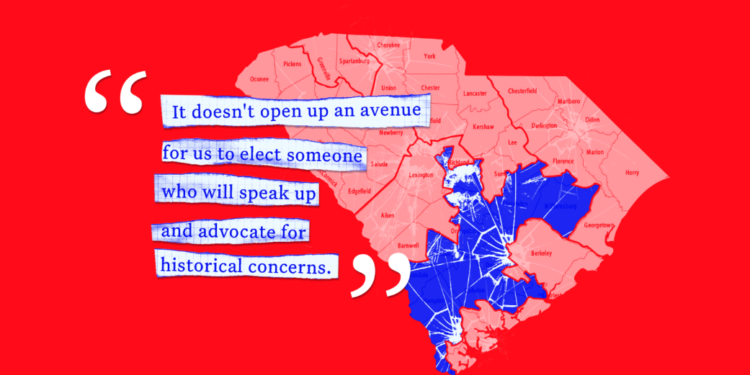Image Source: Democracy Docket
July 16, 2023 Story by: Editor
Our democracy is designed to be inclusive, ensuring that all voters are free from discrimination and can have their voices heard.
In January, a federal court panel unanimously ruled that South Carolina employed racial gerrymandering to disenfranchise Black voters in the state’s 1st Congressional District — a direct challenge to the principle of an equitable democracy.
Last week, the Supreme Court heard oral arguments in Alexander v. South Carolina State Conference of NAACP, an appeal of the federal court’s unanimous decision.
A federal court had already struck down South Carolina’s 1st Congressional District, citing it as a clear instance of racial gerrymandering that prioritized race in redistricting decisions to the detriment of Black South Carolinians.
But what exactly is racial gerrymandering? According to Supreme Court precedent, lawmakers should not primarily consider race when drawing political boundaries unless necessary to comply with the Voting Rights Act, ensuring Black and other minority voters can effectively elect representatives of their choice.
Racial gerrymandering occurs when race becomes the dominant factor in drawing districts without a compelling justification. This practice perpetuates underrepresentation of Black voters, echoing historical injustices dating back to the Jim Crow era.
In Alexander, South Carolina contends that it did not engage in racial gerrymandering against Black voters, but rather pursued partisan gerrymandering to solidify a 6-1 GOP majority in the state’s congressional delegation.
“That’s plain wrong,” said a source close to the case. “Black South Carolinians deserve to choose their own representatives — not the other way around.”
Moreover, using partisan gerrymandering as a guise to undermine the constitutional prohibition against racial gerrymandering is unacceptable. Partisan interests should not override protections for voting rights.
Earlier this year, the Supreme Court’s Allen v. Milligan decision upheld Section 2 of the Voting Rights Act. Now, we look to the Supreme Court to once again defend voters by rejecting attempts to weaken safeguards against racial gerrymandering and protect voting rights.
In August 2023, the Campaign Legal Center, along with the Lawyers Committee for Civil Rights Under Law and other voting rights organizations, submitted a friend-of-the-court brief urging the Supreme Court to uphold the lower court’s decision and uphold protections against racial gerrymandering as guaranteed by the Fourteenth Amendment. Source: CLC

















